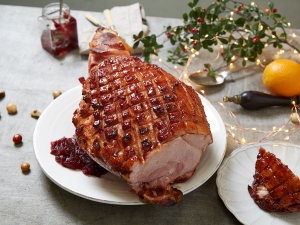Canterbury farmer Sean Molloy joins New Zealand Pork board
Following a recent director election, Canterbury farmer Sean Molloy has been appointed to the New Zealand Pork Industry Board.
 NZPork is asking Kiwis to make sure they are buying New Zealand pork over imported pork this Christmas.
NZPork is asking Kiwis to make sure they are buying New Zealand pork over imported pork this Christmas.
As Kiwis order their Christmas ham, NZPork is encouraging them to check the pork is actually from New Zealand.
Almost 41,000 metric tonnes (MT) of pork has been imported from 31 countries so far during 2021. Most will be further processed in New Zealand, with some labelled as Kiwi-grown pork.
The product labels, which highlight the New Zealand manufacturer rather than the origin of the pork, feature “made in New Zealand” descriptions with “from local and imported ingredients”, sometimes in fine print.
“More than 60% of the pork products consumed in New Zealand is imported from overseas, and for cured products such as bacon and ham, it’s even higher at up to 85%,” says David Baines, chief executive of NZPork.
“A lot of imported pork is produced using practices illegal in New Zealand and no Kiwi wants to think about that over Christmas.
“That’s why when New Zealanders spot a ‘made in New Zealand with local and imported ingredients’ label, they need to know there’s a good chance it has been imported.”
New Zealand’s pork sector operates to high welfare standards compared to many other countries who have less rigorous welfare and environmental regimes, says Baines.
“Our pig farmers are also proud of the high health status of pigs in New Zealand. Our animals aren’t affected by diseases that are impacting pork industries in many other countries.
“New Zealand does not import live pigs but these viruses can enter the country on infected meat. While they are harmless to humans, they could be spread to pigs in the wild or other kinds of farms or lifestyle blocks through infected food scraps – and ultimately be transmitted to the commercial herd.”
So far during 2021, most pork imports have come from Germany, Poland, Australia, Canada, Spain, the United States and Finland.
The World Wide Sires National All Day Breeds Best Youth Camp Best All Rounder plaudit has become family affair, with 2026 Paramount Cup winner Holly Williams following in her sister Zara's footsteps.
DairyNZ is giving New Zealand farmers a unique opportunity to gain hands-on governance and leadership experience within the dairy sector.
Herd improvement company LIC has posted a 5.2% lift in half-year revenue, thanks to increasing demand for genetics.
According to the latest Fresh Produce Trend Report from United Fresh, 2026 will be a year where fruit and vegetables are shaped by cost pressures, rapid digital adoption, and a renewed focus on wellbeing at home.
The Roar is a highlight of the game hunting calendar in New Zealand, with thousands of hunters set to head for the hills to hunt male stags during March and April.
OPINION: The past few weeks have been tough on farms across the North Island: floods and storms have caused damage and disruption to families and businesses.

OPINION: Meanwhile, red blooded Northland politician Matua Shane Jones has provided one of the most telling quotes of the year…
OPINION: This old mutt has been around for a few years now and it seems these ‘once in 100-year’ weather…